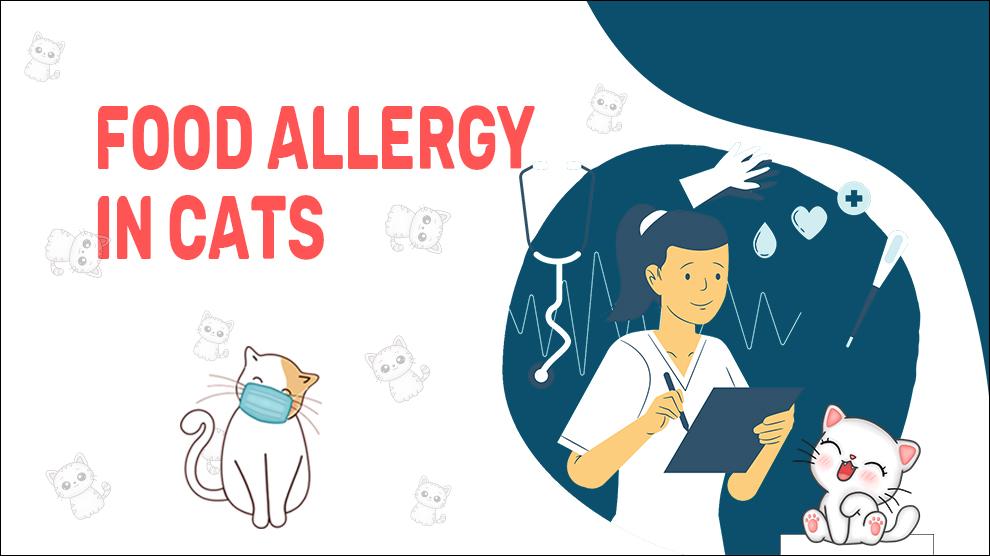What Is Food Allergies In Cats?
Food allergies are an increasingly common health issue among cats. A food allergy occurs when a cat's immune system reacts abnormally to a certain type of protein in its diet.
Symptoms can range from mild to severe and can affect multiple body systems. Identifying and treating a food allergy is important to ensure the cat's health and well-being.
Clinical Signs Of Food Allergies In Cats
The symptoms of a food allergy in cats can vary widely and may include:
- Itching and scratching, especially around the face and ears
- Redness and inflammation of the skin
- Hair loss and skin lesions
- Vomiting and diarrhea
- Chronic ear infections
- Respiratory issues such as sneezing, coughing, and wheezing
- Lethargy and decreased appetite
- Itching Around The Anus
- Scooting Rear
- Strained Defecation
- Licking At The Site
- Excessive Scratching
- Skin Lesions
- Circular Crust On Skin
- Redness At The Site
- Skin Bumps
- Hair Loss At The Site
- Skin Ulcer
- Pustules
These symptoms can appear suddenly or develop gradually over time and may be intermittent or ongoing.
Treatment Options For Food Allergies In Cats
The first step in treating a food allergy in cats is to identify the allergen.
This may involve a process of elimination, where the cat is fed a diet consisting of novel proteins and carbohydrates that they have not been exposed to before.
Alternatively, allergy testing may be used to identify the specific allergen. Once the allergen has been identified, the cat's diet must be modified to eliminate the offending ingredient.
This may involve switching to a commercial cat food that does not contain the allergen or preparing a homemade diet using ingredients that the cat is not allergic to.
It is important to work with a veterinarian or veterinary nutritionist to ensure that the cat's nutritional needs are met during this transition.
In some cases, medication may be used to manage symptoms such as itching and inflammation.
Antihistamines and corticosteroids are commonly used for this purpose, but long-term use can have side effects and should be monitored closely by a veterinarian.
Home Remedies For Food Allergies In Cats
- Elimination Diet: The first step in managing a food allergy in cats is to identify the allergen. An elimination diet involves feeding your cat a limited-ingredient diet for 8-12 weeks that only contains proteins and carbohydrates that your cat has never eaten before. This can help to pinpoint the cause of the allergy and help you find a suitable diet for your cat.
- Probiotics: Probiotics are beneficial bacteria that can help to restore the natural balance of microorganisms in your cat's gut. This can help to improve your cat's digestive health and reduce the severity of food allergy symptoms.
- Omega-3 Fatty Acids: Omega-3 fatty acids are anti-inflammatory and can help to reduce inflammation associated with food allergies. Adding a fish oil supplement to your cat's diet may help to improve its symptoms.
- Topical Treatments: Some cats with food allergies may develop skin irritations or rashes. Using a topical treatment, such as a medicated shampoo or cream, can help to soothe their skin and reduce itching.
How To Prevent Food Allergies In Cats?
There is no surefire way to prevent food allergies in cats, but there are some steps that owners can take to reduce the risk.
Feeding a high-quality, balanced diet and avoiding foods that are known to be common allergens can help. It is also important to introduce new foods gradually and monitor the cat's response to them.
Affected Cat Breeds Of Food Allergies
Food allergies can occur in any breed of cat, but some breeds may be more prone to developing allergies than others.
Siamese and Himalayan cats, for example, may be more likely to develop food allergies.
Causes For Food Allergies In Cats
Causes:
Food allergies occur when a cat's immune system overreacts to a protein in its diet. Common allergens include beef, chicken, fish, and dairy products.
Some cats may also be allergic to grains or certain additives in commercial cat food. In rare cases, a cat may be allergic to multiple ingredients.
When To See A Vet For Food Allergies In Cats?
If a cat is exhibiting symptoms of a food allergy, it is important to consult with a veterinarian.
They can help identify the allergen and develop a treatment plan to manage the cat's symptoms.
In severe cases, anaphylaxis can occur, which is a life-threatening allergic reaction that requires immediate medical attention.
Food Suggestions For Food Allergies In Cats
If your cat has been diagnosed with a food allergy, it's important to switch to a diet that does not contain the allergen.
Some options include:
- Limited Ingredient Diets: These diets contain a limited number of ingredients, making it easier to identify and eliminate the allergen.
- Novel Protein Diets: These diets contain novel proteins, such as venison or rabbit, which your cat may not have been exposed to before and is less likely to cause an allergic reaction.
- Hydrolyzed Protein Diets: These diets contain proteins that have been broken down into smaller pieces, making them less likely to cause an allergic reaction.
Conclusion
Food allergies in cats can be difficult to diagnose and manage, but with the right approach, it is possible to provide your cat with a nutritious and balanced diet that meets its nutritional needs while avoiding allergens.
If you suspect your cat has a food allergy, it's important to consult with your veterinarian to determine the cause and develop an appropriate treatment plan.
With the right care, your cat can live a happy and healthy life free from food allergy symptoms.











